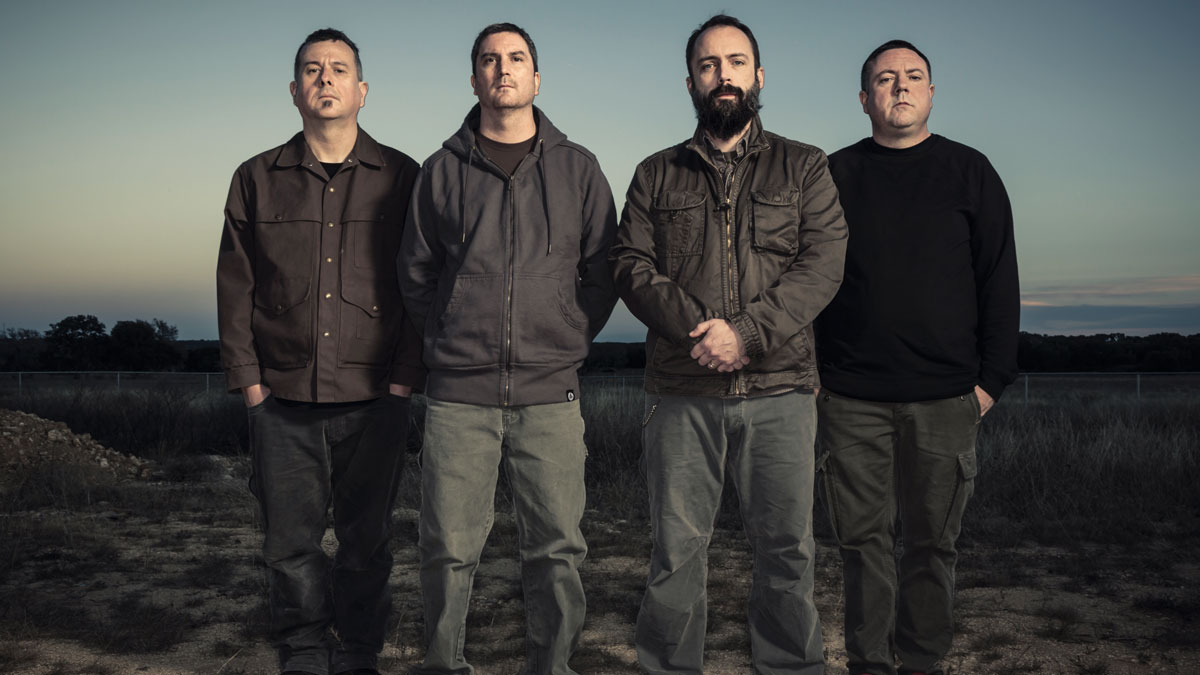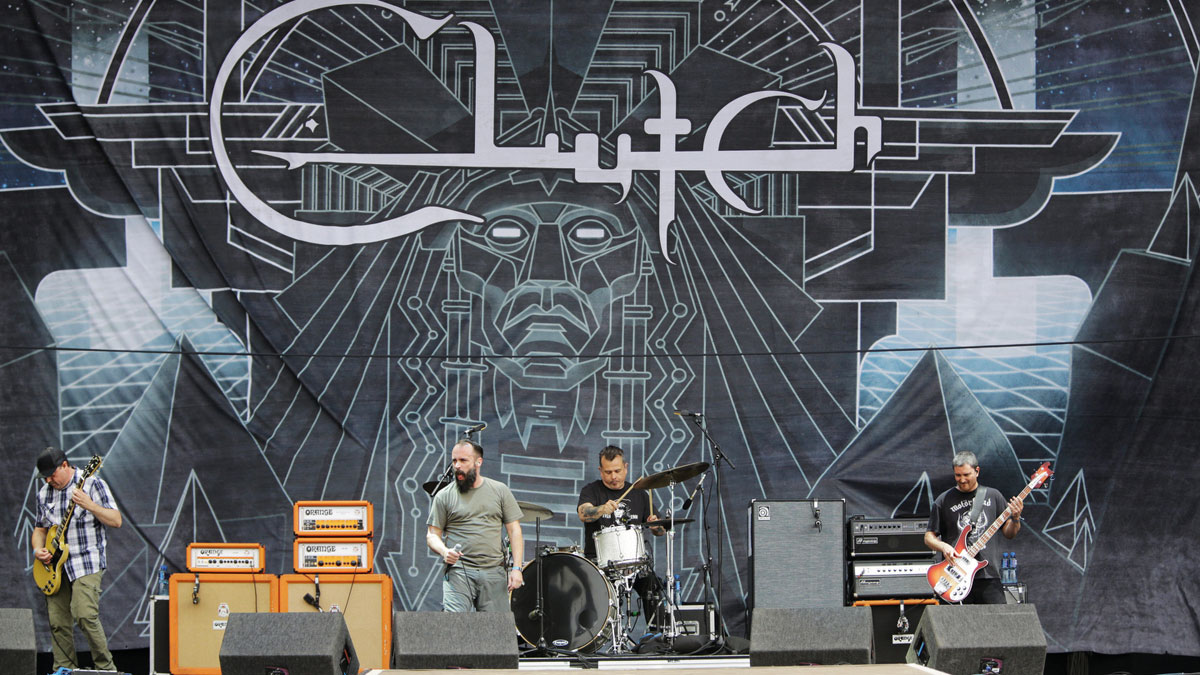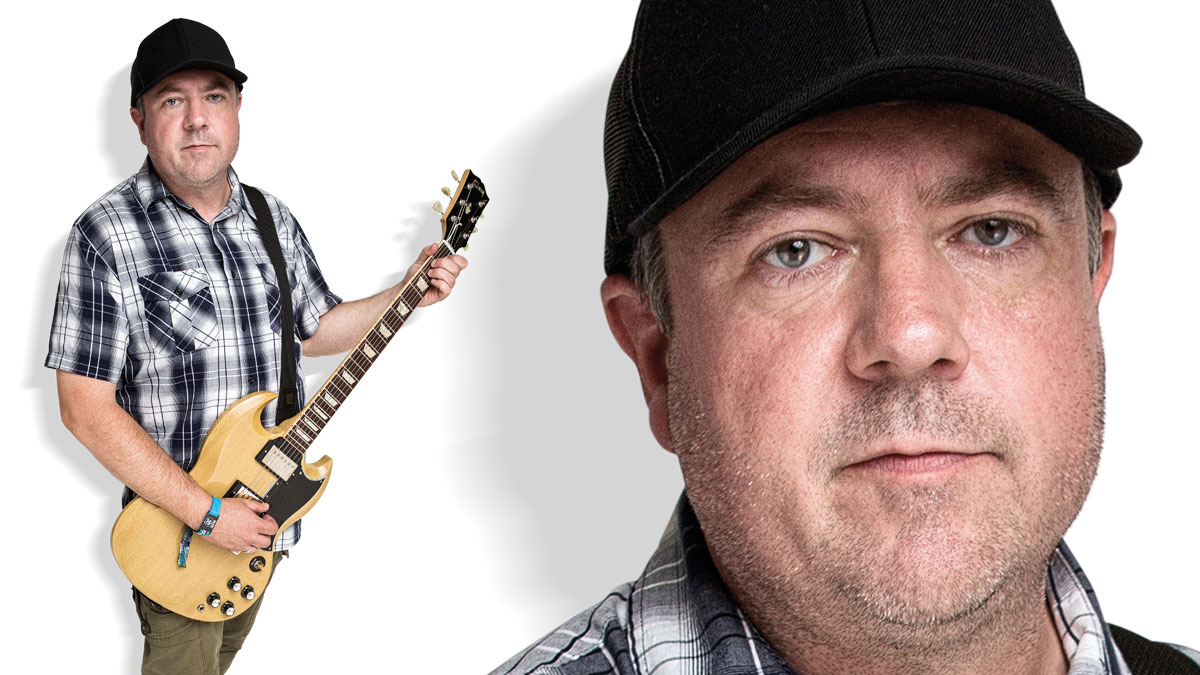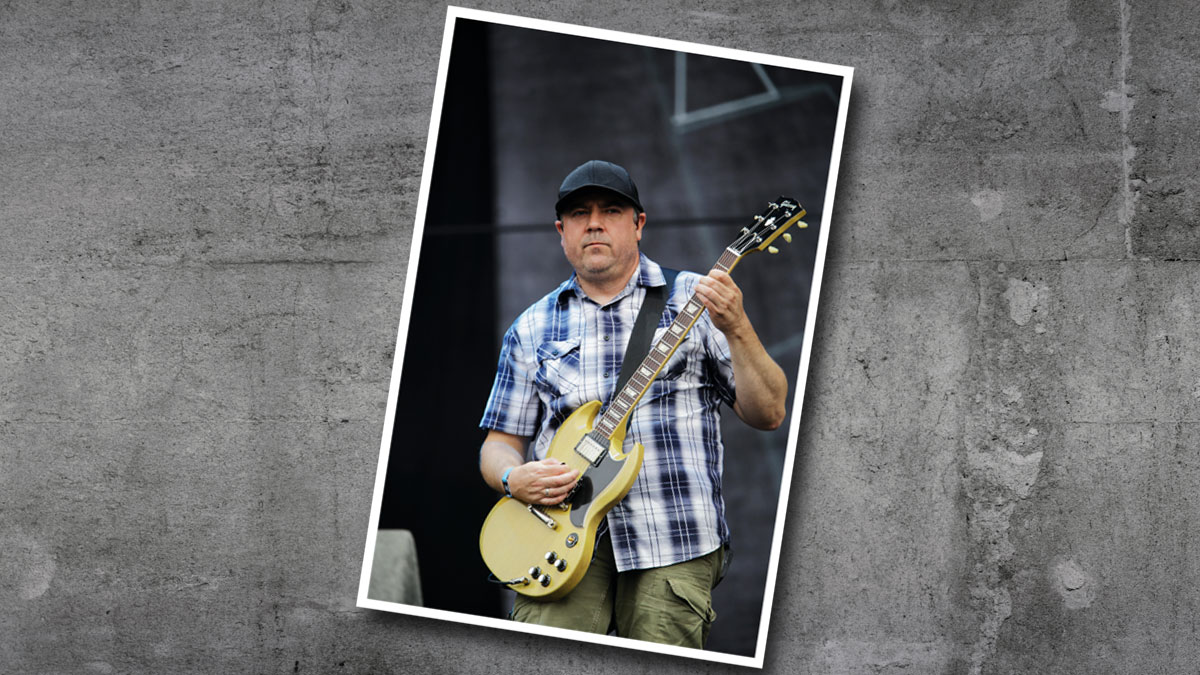Clutch's Neil Fallon and Tim Sult talk Psychic Warfare
Losing their minds on the follow-up to Earth Rocker

Introduction
Clutch are 23 years into a life on the road and some how raising their game even higher on Psychic Warfare. We peer inside the band’s workings to find out how Neil Fallon and Tim Sult are pulling it off.
Calling Clutch’s current momentum a second wind seems slightly discourteous to a band who have maintained remarkably high standards. But it can’t be doubted the Maryland men found a higher gear on 2013’s Earth Rocker; punk-rock urgency, juggernaut blues and sharp lyricism have often been at the core of the Clutch experience, but never quite as potently poured together before.
I knew that Earth Rocker was very successful and I kind of bugged myself out trying to over-analyse it
New album Physic Warfare continues the momentum; capturing the fevered ferocity and deeper atmospherics of their formidable live shows into a bottle of lightning. So just how are these disarmingly modest musicians stepping up when most bands would be mellowing out? Tim Sult accuses Lemmy.
“I don’t know why it’s really happening, but I’ll go with it” he chuckles at the notion of their high-octane turn after 2009’s comparatively measured Strange Cousins From The West, “I think I might blame Motörhead. We toured with them a couple of times and next thing you know all our songs are fast!”
If you’re assuming this comes easy to Clutch, you’re both right and wrong. A truly democratic band, Sult, Fallon, bassist Dan Maines and drummer Jean-Paul Gaster, are certainly never short on ideas but their process changed for this album. Clutch worked hard at crafting Psychic Warfare - harder than they’d ever worked before. But with pressure rearing its head, Fallon had to get out of his own way first.
“Speaking for myself, it was a bit of a head game,” he reveals. “I knew that Earth Rocker was very successful and asked myself how we should follow it up. I kind of bugged myself out trying to over-analyse it. Then I realised when were writing Earth Rocker, we never really thought about it. We were just making another record. That fact dawned upon me; you didn’t think about it for Earth Rocker so don’t think about it now. So it made it a lot easier to just follow one’s gut and not overthink it.”
Don't Miss

Triple filtered
But if they followed their instincts in the songwriting, the filtering of the material to meet their standards involved quite an unusual process during pre-production.
“It was definitely more intense,” notes the vocalist/guitarist, “But that was by design. For example, once we had the songs more or less written we would rehearse them in a running order every day before we recorded them.
“It actually took us a long time to decide on a final track listing,” adds Sult. “Where we felt really sounded like an album as opposed to just a bunch of songs. It’s the first time we’ve ever done that in terms of playing all the songs through to try and find a good track listing.”
“It was sadistic to a point,” admits a deadpan Fallon. “But even though that was demanding. We knew it would end up helping the process.”
Any music’s most brilliant points occur on stage and when you overthink it that’s when it can become less musical
It certainly did. And while there’s Clutch calling cards all over Psychic Warfare there are some surprises, too. A fair few of them are down to the frontman playing more guitar on a Clutch record than he ever has before, often with his favourite G&L T-style model through a vintage 1968 Fender Super Reverb.
His biting blues on A Quick Death In Texas, the downright funky Your Love Is Incarceration and the brooding Western vibe (via an Electro- Harmonix Micro Synth) of Doom Saloon add a freshness and depth to the Clutch sound.
“It kind of ended up that way,” he shrugs on his six-string input, “It’s hard to say, I cannot sing and play guitar to a riff that I didn’t write. If I wrote the song, and was part of the process of writing the lick, I can play the guitar with it as well.
“It’s always a bit of a struggle deciding whether to beef up the song live and play the guitar, because maybe that makes the vocal suffer. Playing a guitar can sometimes be an albatross around the neck, so I’m still always having that conversation with myself.”
What was an easier decision was the road-testing of 75 per cent of the record live on the Earth Rocker run before they ever entered the studio with producer, Machine.
“It’s the most important step I think,” the singer notes. “We’ve recorded songs that were written in the studio and invariably they end up being a case of, ‘I wish I had done this and I wish I had done that’. Those moments only occur on stage.
“Any music’s most brilliant points occur on stage and when you overthink it that’s when it can become less musical. Whereas the gut instincts where you know the part forwards and backwards, when you’re just playing with it, that’s when the fun starts.”
“But we’ve done that since day one,” notes Sult. “As soon as we have a new idea that sounds like a song, we play it live. Even if it’s just an intro. If we have a new riff that we like we’ll use it as an intro somewhere in the set, so we can practise it because it’s fun to play.”

Psychic Connection
Sult’s beefy blues grooves are integral to how Clutch’s songs impact, and he’s clearly from the Iommi school in terms of his proliferate riff-writing. But he’s utterly ruthless in their filtering too.
“We probably had more riffs for this album than we have for any albums in the past,” the guitarist admits. “But we don’t keep a stockpile, we throw them all away so we can start fresh. We probably ended up throwing away around 50 riffs, at least, for this album. But that’s okay.”
We probably ended up throwing away around 50 riffs, at least, for this album. But that’s okay
We’d certainly like to find the contents of that practice room wastebasket. But Clutch’s songs don’t always start with Sult’s riffs. Far from it. “It could be any of us,” explains the guitarist.
“We all have riff ideas and we’ll just start jamming riffs out in the studio and lay down as many ideas as possible. Then Neil will go back and listen to those ideas and see what he can react to the best musically and we’ll start building a song around that.”
As well as working hard to hone his syncopation with Fallon’s vocal rhythms on Psychic Warfare, Jean-Paul Gaster helped shape the inception of songs too.
“Jean-Paul has definitely presented us with a lot of beats,” notes Fallon. “And sometimes they seemed not the most obvious of ideas. I think Our Lady Of Electric Light would be a good example of that. He does a lot of brush work and does a lot of swing that is atypical for hard-rock bands.”
Clutch are that rare breed; a band in touch with the greatest elements of rock, metal and punk heritage but not beholden to them. So the more considered pace of Our Lady Of Electric Light is Fallon’s self-confessed nod to Creedence Clearwater Revival’s brand of Americana, and A Quick Death In Texas has so much ZZ Top swagger it even name checks ‘Mr Gibbons’. But the democracy of Clutch filters it all with their very unique perspective.
Fallon’s role as one of this generation’s great lyricists cannot be brushed over here, even in a guitar mag. Head transplants, greek mythology, fast cars and Winchester rifle-toting preachers… Fallon’s vivid storytelling never disappoints with its invention and intelligence. Earth Rocker was a little lighter on the narratives, but it feels like he’s waded into the tales of Psychic Warfare with glee.
“I think it’s probably because I paid more attention to it,” he ponders with typical even-handed modesty. “I tried to treat each song as a story and really tried to dial that in. So what’s the process like for such an inventive writer; are his lyrics drawn from short stories?
“I try to. There’s usually some kind of vague idea I have in the back of my head that doesn’t always translate to the songs. But in the ideal world, the vibe of the music will create lyrics.”

A well-oiled Machine
Clutch have honed a system that works for them; a stable line-up and a trusted circle around them (most of their road crew have been with them for years) but another key figure seems to have been accepted into the fold to help with this era that has found them attracting new fans and affirming the allegiances of the faithful.
Producer Machine’s involvement in Clutch’s back catalogue consistently reaps rewards; a few songs on 2001’s Pure Rock Fury, the whole of its 2004 follow-up, and undisputed Clutch classic, Blast Tyrant. His return for Earth Rocker sealed the deal for them.
If anyone else said the things that Machine says to us we’d kick them out of the room!
“A very organic and democratic process,” is how Fallon describes the workings of the Clutch machine. “It’s a collective, and that’s one of the things we need in a producer like Machine. To be a a dictator for a moment, because we’re so much like a democracy. It’s great fun but it’s also a slow process, so we need someone to point us into a direction.
“We have a relationship with Machine where he can speak very honestly to us. If anyone else said the things that he says to us we’d kick them out of the room! But he gets away with it. I think that’s a healthy thing.” “And he’s definitely getting good at heavier guitar sounds,” adds Sult.
Yes indeed. The tones here are greatest combination of Clutch’s overdriven bluster and blues earthiness we’ve heard to date. But whereas Sult’s always been fairly utilitarian in his choices from an outside perspective, Fallon observes him to be an ‘incessant fiddler’ when it comes to his tone. In a good way.
“He’s always experimenting with his tone,” Fallon adds. “His playing is always consumedly Tim, but he filters it through whatever amps and guitars he’s playing.” And pedals too. “There’s actually a little bit more Big Muff on this album than I’ve ever used,” says Sult.
“I don’t usually use distortion or fuzz pedals live, but on the recording of this album, on three or four songs, there is a little bit of Big Muff. Machine has an old Russian one. So to replicate that, I recently bought a Creepy Fingers clone, it’s made by Brad [Davis], the bass player from Fu Manchu. He makes his own pedals. So I’m going to be trying that live. I also use a wah all the time; I’ve been accused of over-wahing!”

Road Warriors
We find the accused not guilty; nobody is ever going to confuse Sult with Kirk Hammett on that front. Elsewhere, the classic rock staple Marshall JCM800 and Fender Bassman covered the grunt on Psychic Warfare for him, while the pair’s recent endorsement with Orange finds the OR100 sliding into his rig.
“I’m liking the OR100s right now. I like both the clean and the dirty channel, they both sound great. I like how the clean channel has the old school Orange sound, you turn it all the way up and it’s as close to an old Orange as possible.” The guitar issue is less clean cut though; his ’59 reissue Les Paul was the only go-to on the album, but we’ve seen Sult moving back to the lighter SGs for recent gigs too.
I’m embarrassed to admit there were no ambitions back then. I just kind of went with it the whole time
“Yeah, I go back and forth. The last show that we played, I tortured myself by playing my ’59 reissue. I love the tone of it and it’s the guitar I played on Physic Warfare, but I could barely wrap my hand around it. I don’t know what I’m going to play for the next show quite honestly. I’m going to be fi guring that out pretty soon. I might be playing a Fender!”
But these are small concerns for a band that’s ‘basically been on tour since 1992’, in Sult’s own estimations. So if this isn’t a second wind for Clutch, the last few years have at the very least reaffirmed to the world what a truly great rock band they are. Not bad for four friends who started out in 1991 with no grand schemes whatsoever.
“I’m embarrassed to admit there were no ambitions back then,” Neil Fallon reflects. “I just kind of went with it the whole time; the first 10 years of this band it wasn’t something I had planned on. It was something I did by default and it was probably around 2003 that I realised you either start taking this more seriously, or you say goodbye to it. And there was no way I was saying goodbye to it.”
That they’re still here and thriving more than 20 years later is testament to this understanding; Clutch and their trusted team know what they’ve got and what kind of unnecessary behaviour will threaten that.
“There’s no chaos, no drama and egos to battle,” is how Sult succinctly puts it. “We know how to act like adults.”
So, the challenges presented for Clutch are now exactly what they should be for a band; they’re creative. How to keep upping the ante on record and onstage.
“I have to speak about it by way of an analogy,” says Fallon. “It’s easier to become a creative couch potato and do what you know well, and rest on your laurels. But in writing faster music, which we started doing on Earth Rocker, it’s easier to keep running. When you run it’s a real pain in the ass to stop your pace. And for us, since we started that, we realised this is fun. We can’t stop now. We keep going, and we do surprise ourselves sometimes on stage; ‘Holy shit, this song’s fast!’”
Psychic Warfare is out now on Weathermaker.
Don't Miss

Rob is the Reviews Editor for GuitarWorld.com and MusicRadar guitars, so spends most of his waking hours (and beyond) thinking about and trying the latest gear while making sure our reviews team is giving you thorough and honest tests of it. He's worked for guitar mags and sites as a writer and editor for nearly 20 years but still winces at the thought of restringing anything with a Floyd Rose.

